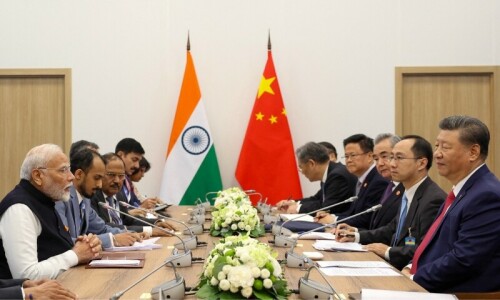THERE is a fresh push by the state to stamp out all criticism by using the alibi of protecting national interests. Monday’s post on X by Defence Minister Khawaja Asif only strengthens this impression, though the irony of a government representative using a platform blocked by his own administration to convey the message is quite bizarre. Mr Asif said that those who leak official secret documents could be tried under the Official Secrets Act, while those who share such information could go to jail or be fined. He specifically mentioned that material on social media, which could harm Pakistan’s “strategic and economic interests” or hurt its ties with “friendly and brotherly countries”, would not be tolerated. Other high officials have of late also criticised ‘harmful’ matter on social media. The Punjab government, meanwhile, is reportedly considering a defamation law to counter ‘false’ news.
The aforementioned efforts are indicative of a state apparatus, which is used to controlling the flow of information and narrative, unable to cope with the flood of information and opinions — some of it indeed inauthentic — unleashed by social media. The defence minister’s threat to haul up those exposing state secrets appears to be an overreaction. Genuine matters involving national security — especially material that may put lives and identities of state operatives in danger — can and should be withheld or redacted. But imposing a blanket ban on releasing all information the state is privy to smacks of censorship. This would effectively be a death sentence for what remains of investigative journalism in Pakistan, while whistle-blowers seeking to expose corruption within the corridors of power will be silenced. The minister’s mention of ‘strategic and economic’ interests is also overly broad. For example, will columns, tweets and posts quoting official sources discussing privatisation or other key economic matters be deemed liable to ‘punishment’ under the new information regime? Instead of bulldozing such laws, the administration needs to consult stakeholders and civil society to ensure that the right to freedom of information, and the right of the state to hold back genuinely sensitive details, are balanced. Checks need to be in place, while the government must jettison opacity by making citizens’ right to access information more transparent. Enforcing blanket bans will only add to disinformation, as conspiracy theories and half-truths will be promoted in the absence of facts.
Published in Dawn, May 15th, 2024










































Dear visitor, the comments section is undergoing an overhaul and will return soon.